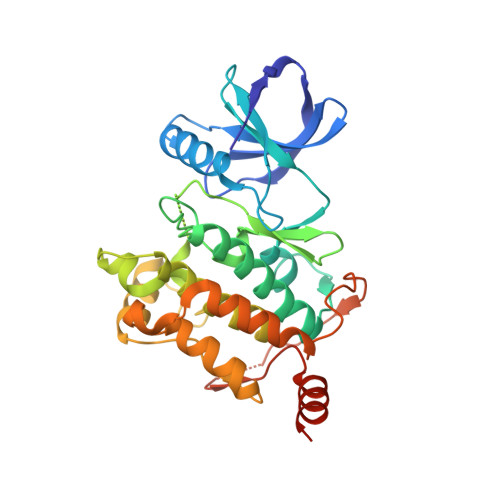Discovery of 2,4-1 H -Imidazole Carboxamides as Potent and Selective TAK1 Inhibitors.
Veerman, J.J.N., Bruseker, Y.B., Damen, E., Heijne, E.H., van Bruggen, W., Hekking, K.F.W., Winkel, R., Hupp, C.D., Keefe, A.D., Liu, J., Thomson, H.A., Zhang, Y., Cuozzo, J.W., McRiner, A.J., Mulvihill, M.J., van Rijnsbergen, P., Zech, B., Renzetti, L.M., Babiss, L., Muller, G.(2021) ACS Med Chem Lett 12: 555-562
- PubMed: 33859795
- DOI: https://doi.org/10.1021/acsmedchemlett.0c00547
- Primary Citation of Related Structures:
7NTH, 7NTI - PubMed Abstract:
Herein we report the discovery of 2,4-1 H -imidazole carboxamides as novel, biochemically potent, and kinome selective inhibitors of transforming growth factor β-activated kinase 1 (TAK1). The target was subjected to a DNA-encoded chemical library (DECL) screen. After hit analysis a cluster of compounds was identified, which was based on a central pyrrole-2,4-1 H -dicarboxamide scaffold, showing remarkable kinome selectivity. A scaffold-hop to the corresponding imidazole resulted in increased biochemical potency. Next, X-ray crystallography revealed a distinct binding mode compared to other TAK1 inhibitors. A benzylamide was found in a perpendicular orientation with respect to the core hinge-binding imidazole. Additionally, an unusual amide flip was observed in the kinase hinge region. Using structure-based drug design (SBDD), key substitutions at the pyrrolidine amide and the glycine resulted in a significant increase in biochemical potency.
- ZoBio BV, J.H. Oortweg 19, 2333 CH Leiden, The Netherlands.
Organizational Affiliation:



















